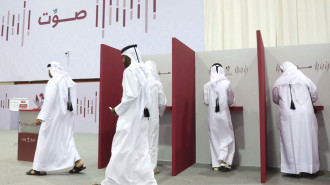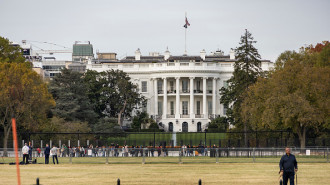Middle East Christians celebrate Easter amid conflict and unrest
Millions of Christians are celebrating Easter across the Middle East, where many of them are struggling to maintain their ancient communities amid conflict, persecution, and political instability.
Today, Christians represent around four percent of the region's population, down from 20 percent a century ago.
As a minority group in a region hit by profound political, economic and social crises they are particularly vulnerable, and millions have fled over the past decades.
Easter week got off to a bloody start last Sunday when 45 people were killed in attacks on two Coptic churches in Egypt, which were claimed by the Islamic State group.
The Coptic population of around 10 million have long faced state and societal discrimination, but last week's attack was the worst on the community in recent memory.
Despite heightened fears, Coptic Pope Tawadros II led a mass late on Saturday in Saint Mark's Cathedral where worshippers passed through three metal detectors as policemen and soldiers stood guard in the sprawling compound and on the streets outside.
"We pray for peace, to spread in hearts and minds," Tawadros said in a speech during the mass, describing the bombings as "beyond the boundaries of humanity." In Egypt, Copts break a 55-day fast, abstaining from all animal products, following Saturday's mass.
"On usual occasions Holy Week is a week for reflection, for considering things that go wrong in the world, the presence of sin in the world and the brokenness of humanity," said Bishop Angaelos, the General Bishop for the Coptic Orthodox Church in Britain.
"I don't think the churches are any emptier, in fact they might be fuller," he told AFP. "But it just means people leave home knowing they are a target, but that doesn't stop them."
'We hope to have peace next year'
In Jerusalem's Old City, under Israeli occupation, thousands marked Easter Sunday at the site where they believe Jesus was resurrected.
Visitors and worshipers filed through the Church of the Holy Sepulchre, built on the site where tradition says Jesus was crucified, buried and resurrected. Many prostrated themselves over his tomb, leaving in tears.
"It's beautiful," Michael Hanna, 64, a Coptic Christian originally from Egypt but who has lived in Australia since 1980, said of his visit.
"You can't imagine the feeling touching the places where Jesus touched. I can't describe the feeling," the postal worker said.
Archbishop Pierbattista Pizzaballa, apostolic administrator of the Latin Patriarchate of Jerusalem, entered through the church's heavy wooden doors to lead mass, stopping to kneel before the stone where Jesus's body was anointed, then splashing holy water on the crowds.
Wajeeh Nusseibeh, 67, a member of one of the two Muslim families who traditionally hold the key and guard the church, said this year there seemed to be fewer people visiting than in the past.
He blamed tough economic times and conflict, with Middle Eastern Christians under threat in countries such as Iraq and Syria.
At the same time, Jerusalem also remains the focal point of the decades-long Israeli-Palestinian conflict. The Holy Sepulchre is located in East Jerusalem, occupied by Israel in 1967 and later annexed.
Nusseibeh, dressed in a dark suit with a red and black tie, however was keeping the faith.
"We hope to have peace next year," he said as he sat before the entrance's towering wooden doors, keeping an eye on those who entered. "And everyone accepts the other."
Exodus and war
In Iraq, tens of thousands of displaced Assyrian Christians celebrated Holy Saturday in refugee camps, most located near the northern city of Erbil. The country has witnessed one of the largest exoduses of Christians from the Middle since 2003, with over a million fleeing war, sectarian violence, and, more recently, the Islamic State.
For Good Friday in the Syrian city of Homs, a procession passed through the war-torn city centre. "Christians will always be in Syria," declared Archbishop Selwanor Boutros Alnemeh to the LA Times.
Since the war began in 2011, around half of the country's Christians have left the country, part of the wave of millions who have fled the fighting.
On Sunday, Pope Francis urged an end to "horror and death" in Syria as he celebrated the traditional Easter Day mass in Rome.
The Easter mass, the highlight of the Christian calendar, began under a cloudy sky where worshippers had gathered since the early hours to gain access amid tight security.
He expressed hope that Jesus' own sacrifice might "sustain the efforts of all those actively engaged in bringing comfort and relief to the civil population in Syria, prey to a war that continues to sow horror and death."
And he prayed for peace for the entire Middle East "beginning with the Holy Land, as well as in Iraq and Yemen."





 Follow the Middle East's top stories in English at The New Arab on Google News
Follow the Middle East's top stories in English at The New Arab on Google News


